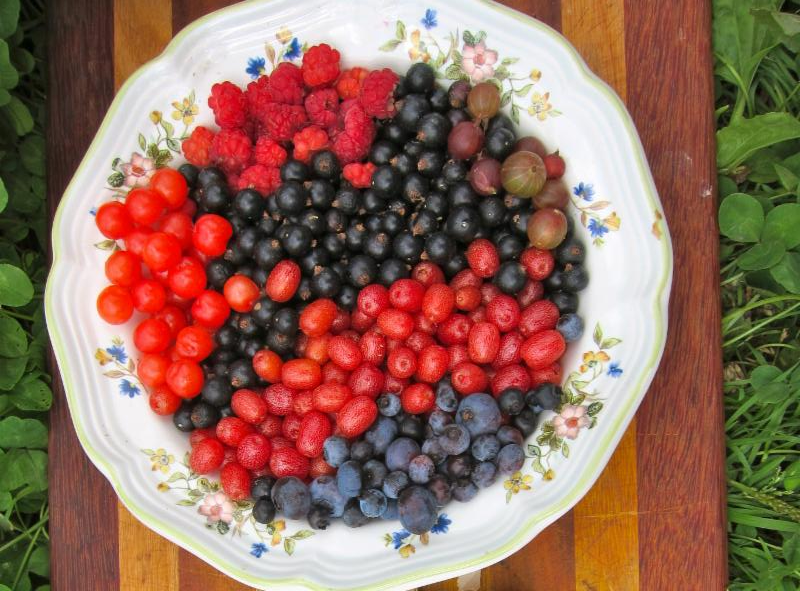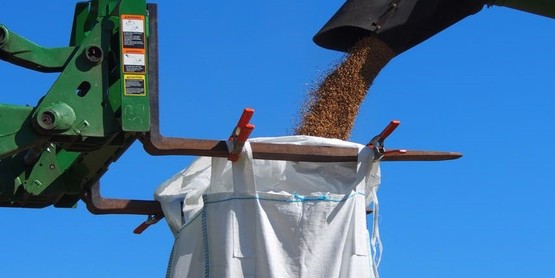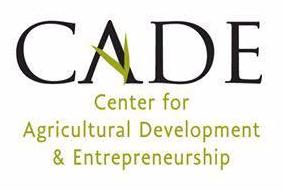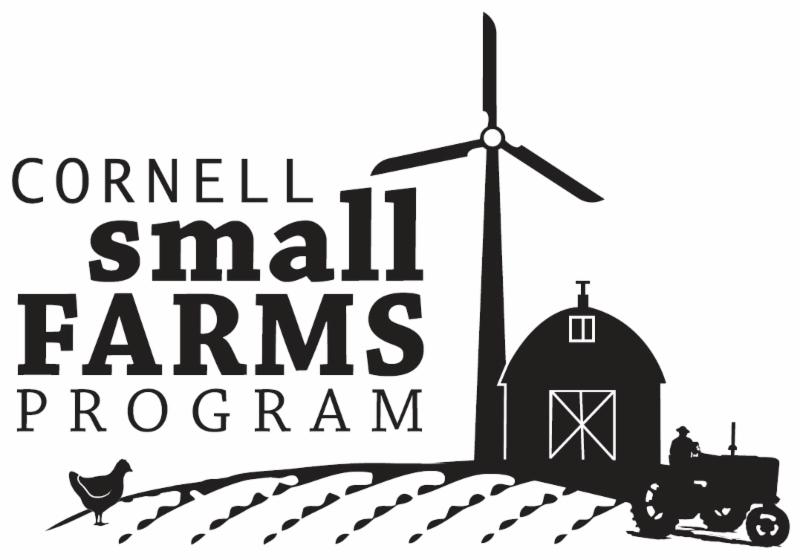Greetings!
The Small Farms update summarizes announcements, resources, opportunities and upcoming events relevant to small farms. Please feel free to share this information in newsletters, email lists, etc. If you would like to submit an item for an upcoming issue, please visit our new online form. Subscribe here. Thank you again for your interest and support of small farms in New York.
Anu Rangarajan, Director, Cornell Small Farm Program
|
| Small Farms Program Highlights |
|
|
|
Reduced Tillage Project Brings Together Organic Vegetable Growers
How can reduced tillage practices help vegetable growers build soil health, control weeds, and boost productivity? The Cornell Reduced Tillage Team has been ramping up research to help organic growers at any scale. This August, farmers and educators toured the Cornell Vegetable Research Farm in Freeville, NY to see different tools and techniques. More details on the project are here.
|
BF 110: Soil Health
The health and productivity of the soil forms the basis for any farm's success, profitability, and ecological sustainability. Successful farmers need to develop a holistic approach to preserving and building soil health and fertility. Stewardship of the soil is arguably the most important job of any farmer or gardener. Learn more about what soil health is and why is it important for your farm in this online course beginning November 10.
|
|
 |
New York State New Farmers Grant Fund
New York State has allocated $1 million in the 2016-2017 state budget for the third round of the New York State New Farmers Grant Fund. Its purpose is to provide grants to support beginning farmers who have chosen farming as a career and who materially and substantially participate in the production of an agricultural product on their farm. These grants will help farmers improve profitability resulting in the growth of agribusiness and the concomitant tax revenues within the state. Learn more in the Funding section below.
|
 BF 122: Berry Production If you're exploring the idea of adding berries and bramble fruits to your farm, this online course will help you consider all the aspects of this decision, from varieties and site selection all the way through profit potential and marketing. This course will be especially useful if you are exploring the possibilities of growing berries for income - be it supplemental or for your livelihood. The material presented will assume little past knowledge of farming, but a background in gardening will be very helpful. |
Veteran Trainings in Agroforestry
The Cornell Small Farms Program, with support from New York State and the USDA, announces three trainings in agroforestry this coming Winter and Spring to support Veterans looking to get into agricultural production. Agroforestry includes farming practices that combine trees and forests with crop production. Three trainings will convene to focus on three of the most viable tree-crop enterprises including maple syrup, log-grown shiitake mushrooms, and silvopasture (combining livestock with trees). Each training includes classroom instruction and site visits to farms in active production. Content will cover the technical aspects of production as well as the financial and business considerations for each venture. Click here for information about the workshops and to register.
|
Renewable Agriculture and Food Systems (formerly American Journal of Alternative Agriculture) is a multi-disciplinary journal which focuses on the science that underpins economically, environmentally, and socially sustainable approaches to agriculture and food production. A special issue of the journal will examine opportunities and challenges faced by small and medium-sized farms and other related issues, in reference to the intermediated markets that make up regional food systems. If you would like a paper considered for this special issue, send a 500-word abstract to Adrianne Traub at ajtraub@syr.edu by December 1, 2016.
|
 Post-Harvest Grain Management Workshop November 7, 1pm-3pm. Hudson Valley Farm Hub, 1875 Hurley Mountain Rd., Hurley, NY 12443Features of this program include d iscussion of grain post-harvest considerations (cleaning, drying and storage), a viewing and demonstration of barrel/rotary grain cleaner, air screen cleaner, and gravity table, and presentations on stored grain pests and IPM of stored grain. SPACE IS LIMITED - Register ahead to reserve your spot. Register online here.Registration is free if registered by 11/6, or $10 for RSVPs on day of event. If you have any questions, contact Carrie at 845-340-3990 x311 or email cad266@cornell.edu. Learn more about the program and featured speakers here. |
Farm Brewery Summit
November 10, 9am-4:30pm. 840 Upper Front St., Binghamton, NY 13905
Those interested in learning more about how to grow quality malting barley that brewers and malt houses are interested in purchasing will want to attend Cornell Cooperative Extension of Broome County's Farm Brewery Summit on November 10th. Local brewers and malt houses looking for additional suppliers of malting barley will want to attend to network with growers across the region and state. Attendees will come away with a better understanding of how to grow quality malting barley, how to work with malt houses to secure a contract to grow malting barley, how brewers are using malting barley at a regional and statewide level, and how to advance the NYS Farm Brewery industry. The cost to attend this full day learning opportunity is $30, which includes a locally sourced lunch prepared by Water Street Brewing Co, all presenter materials and time to network with attendees. To learn more about the agenda and presenters for the day, and/or to register and pay securely online, click here. Registration ends on November 8, 2016.
|
Labor Roadshow: Helping Agriculture Employers Stay Current on Employment Rules and Best Practices
November 15-18, 10am-4pm. Four locations across NY: Elba, Auburn, Saratoga Springs, and Watertown
A stable, well-trained workforce is the lifeblood of agriculture. The Agriculture Workforce Development Council (AWDC) was formed to raise awareness of on-going labor issues and to bring resources to farm operators so they can adopt best practices. Even well managed operations can struggle with understanding and filtering the multitude of legal and regulatory requirements associated with all aspects of managing a workforce. This AWDC program is a full day program, specifically for farm owners and managers to gain tools and information to help their farm business attract and retain skilled workers. Presenters will include members of the Agricultural Workforce Development Council along with three leading experts on labor law. For more information, check out the informational flyer. To register, please send farm name, attendee name(s), and contact email address to registration@nedpa.org
|
MANY MORE EVENTS at our Statewide Events Calendar.
|
|
Career, Etc. Opportunities
|

Executive Director: Center for Agricultural Development and Entrepreneurship
The Center for Agricultural Development and Entrepreneurship (CADE) is a 501(c)3, not-for-profit organization whose mission is to increase the number and diversity of successful farm enterprises and related businesses in New York. CADE works to build a vibrant food system, in which locally owned agricultural businesses thrive and consumers are nourished by healthy sustainably produced food. The Executive Director of the Center for Agricultural Development and Entrepreneurship (CADE) reports to the Board of Directors and is responsible for CADE's consistent achievement of its mission. The CADE Executive Director is responsible for: Program Development and Implementation, Board Liaising, Strategic Partnership Development, Human Resource Management, Financial and Compliance Management, and Institutional Advancement and Development. To apply, send cover letter and resume to office@cadefarms.org (subject: EXECUTIVE DIRECTOR) by 5 p.m. on Monday, November 14. For more information, visit www.cadefarms.org/careers.
|
Farmers Market Promotion Program, Project Coordinator
This is a half (0.50) FTE position to manage all aspects of the three-year, FMPP (Farmers' Market Promotion Program) Grant. The purpose of this grant is to increase consumption of and access to locally and regionally produced agricultural products by supporting, promoting and exploring expansion of all methods of producer-to-consumer direct sales, including farmers' markets, Community Supported Agricultures (CSA), roadside stands, and agritourism activities in Cortland County via a dynamic marketing campaign and completion of a market analysis, site location review and strategic plan for a year-round indoor farmers' market and commercial kitchen in Cortland County. This is a half time, 20 hours a week position. The funding for this position is through a USDA grant for 36 months. This position will reduce to 15 hours per week for the third year. This grant-funded position is available through September, 2019. To apply, mail or fax your cover letter and resume with professional references to: Jackie Leaf, Executive Director, Seven Valleys Health Coalition, 10 Kennedy Parkway, Cortland, NY 13045.
|
Food Insecurity Nutrition Incentive (FINI) Grant Program
Th e Food Insecurity Nutrition Incentive (FINI) Grant Program supports projects to increase the purchase of fruits and vegetables among low-income consumers participating in the Supplemental Nutrition Assistance Program (SNAP) by providing incentives at the point of purchase. Grantees conduct a project assessment and cooperate with and contribute to independent evaluations to determine the relative effectiveness of the grant program in achieving the legislative goals of "increasing fruit and vegetable purchases" and "improving the nutrition and health status" of participating households. Applications are due December 16, 2015. Visit nifa.usda.gov for more information.
|
USDA Announces Streamlined Guaranteed Loans and Additional Lender Category for Small-Scale Operators
The U.S. Department of Agriculture (USDA) today announced the availability of a streamlined version of USDA guaranteed loans, which are tailored for smaller scale farms and urban producers. The program, called EZ Guarantee Loans, uses a simplified application process to help beginning, small, underserved and family farmers and ranchers apply for loans of up to $100,000 from USDA-approved lenders to purchase farmland or finance agricultural operations. EZ Guarantee Loans offer low interest rates and terms up to seven years for financing operating expenses and 40 years for financing the purchase of farm real estate. USDA-approved lenders can issue these loans with the Farm Service Agency (FSA) guaranteeing the loan up to 95 percent. USDA is providing a 90-day period for the public to review and comment on program improvements. To review program details, visit www.regulations.gov a nd follow the instructions to submit comments.
|
New York State New Farmers Grant Fund
The New York State New Farmers Grant Fund will help farmers improve farm profitability through one or both of the following goals: expanding agricultural production, diversifying agricultural production and/or extending the agricultural season, and/or advancing innovative agricultural techniques that increase sustainable practices such as organic farming, food safety, reduction of farm waste and/or water use. Applications must be postmarked by January 27, 2017. Grant awards will be announced in the Spring of 2017. For more information or to apply, click here.
|
 This four-page PDF publication from Great Plains Grazing explains how winter-wheat growers can use Canopeo, a green-canopy-cover measurement app, to help them manage winter grazing without reducing subsequent crop yield. The Canopeo app can also be applied to monitoring crop growth, quantifying damage by hail, freeze, pathogens, and drought, and more. Visit www.canopeoapp.com for more information about the app. This four-page PDF publication from Great Plains Grazing explains how winter-wheat growers can use Canopeo, a green-canopy-cover measurement app, to help them manage winter grazing without reducing subsequent crop yield. The Canopeo app can also be applied to monitoring crop growth, quantifying damage by hail, freeze, pathogens, and drought, and more. Visit www.canopeoapp.com for more information about the app. |
Tax Tips for Forest Landowners for the 2016 Tax Year
Well managed forests produce timber and other forest products, provide wildlife habitat, recreational opportunities, aquifer and watershed protection, and other amenities. Non-industrial private woodlands comprise approximately 60% of the nation's total forests. Providing tailored tax information is one way in which the Forest Service is working to increase forest productivity on non-industrial forest lands. This report provides up-to-date federal income tax information affecting timber transactions. It assists woodland owners, logging professionals, foresters and their tax accountants in filing the 2016 tax returns. Visit the National Timber Tax website for more resources and information.
|
 Beyond Black Plastic: Beyond Black Plastic:
Cover crops and no-till for organic vegetable production
While the use of black plastic is allowed within organic agriculture, it is inherently unsustainable as it is a petroleum-based product and difficult to recycle.
Every acre of land farmed using a black plastic system produces 100-120 lb of waste that typically goes to landfills. This 24-page guide looks beyond plasticulture and evaluates the effects of different mulch systems on soil quality and fertility, weed control, yields and waste production, and profitability for small to mid-size vegetable farms. Download the guide for free online at nesare.org.
|
Need personal help?
Sometimes local questions are best answered by your neighborhood Cornell Cooperative Extension agent. Check out our county-by-county listing of small farm agents here. You can also get to know our Cornell Small Farms Program staff, or contact us. Just starting to farm? We have an extensive directory of beginning farmer service providers across the Northeast in the "Who Can Help?" section of our Northeast Beginning Farmers Project website.
|

The Small Farms Update is intended as a resource for farmers and agricultural service providers in New York and the Northeast, and is provided to you by Cornell Small Farms Program. We envision a future where diverse and vibrant urban and rural farms build human capacity, revitalize communities, supply regional food systems, and foster ecological resilience in a changing world. The Cornell Small Farm Program is a joint effort of the College of Agriculture and Life Sciences and Cornell Cooperative Extension.
|
|